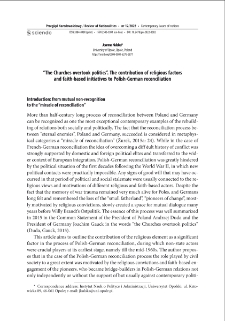Digital Library of Zielona Góra contains 65 553 digital objects
Object
Title: "The Churches overtook politics". The contribution of religious factors and faith-based initiatives to Polish-German reconciliation
Tytuł publikacji grupowej:
Abstract:
More than half-century long process of reconciliation between Poland and Germany can be recognized as one the most exceptional contemporary examples of the rebuilding of relations both socially and politically. The fact that the reconciliation process between "eternal enemies", Poland and Germany, succeeded is considered in metaphysical categories a "miracle of reconciliation". The essence of this process was well summarized in 2015 in the Common Statement of the President of Poland Andrzej Duda and the President of Germany Joachim Gauck in the words "the Churches overtook politics". ; This article aims to outline the contribution of the religious element as a significant factor in the process of Polish-German reconciliation, during which non-state actors were crucial players at its earliest stage, namely till the mid-1960s. ; The author proposes that in the case of the Polish-German reconciliation process the role played by civil society to a great extent was motivated by the religious convictions and faith-based engagement of the pioneers, who became bridge-builders in Polish-German relations not only independently or without the support of, but usually against contemporary political elites. In this particular case, reconciliation, religiously rooted, was both deliberated and practically utilized with reference to its theological understanding.
Wydawca:
Zielona Góra: Oficyna Wydawnicza Uniwersytetu Zielonogórskiego
Format:
Identyfikator zasobu:
DOI:
Strony:
Źródło:
Przegląd Narodowościowy, t. 12
Jezyk:
Licencja:
Licencja CC BY-NC-ND 3.0:
Prawa do dysponowania publikacją:
Biblioteka Uniwersytetu Zielonogórskiego
Object collections:
- Zielonogórska Biblioteka Cyfrowa > Repozytorium > Jednostki organizacyjne > Wydział Nauk Społecznych
- Zielonogórska Biblioteka Cyfrowa > Repozytorium > Typy utworów > Artykuły
- Zielonogórska Biblioteka Cyfrowa > Repozytorium > Czasopisma naukowe i serie wydawnicze UZ > Przegląd Narodowościowy
Last modified:
Sep 7, 2023
In our library since:
Sep 7, 2023
Number of object content hits:
125
All available object's versions:
https://www.zbc.uz.zgora.pl/publication/82819
Show description in RDF format:
Show description in OAI-PMH format:
Objects Similar
Trzop, Beata Zielińska, Maria
Jarząbek, Wanda Skobelski, Robert (1968- ) - red.
Świder, Małgorzata Skobelski, Robert (1968- ) - red.
Post, Barbara Nowak, Beata Maria - red. Paprzycka, Emilia - red. Narkiewicz-Niedbalec, Ewa - red.
Radiukiewicz, Anna Paprzycka, Emilia - red. Mianowska, Edyta - red.
Opioła, Wojciech Iwanek, Jan - red. Tarnawski, Eduard - red.
Fromont, Karol Gorzelana, Joanna - red. nauk. Seul, Anastazja - red. nauk.
Opiłowska, Elżbieta Leszkowicz-Baczyński, Jerzy - red.

